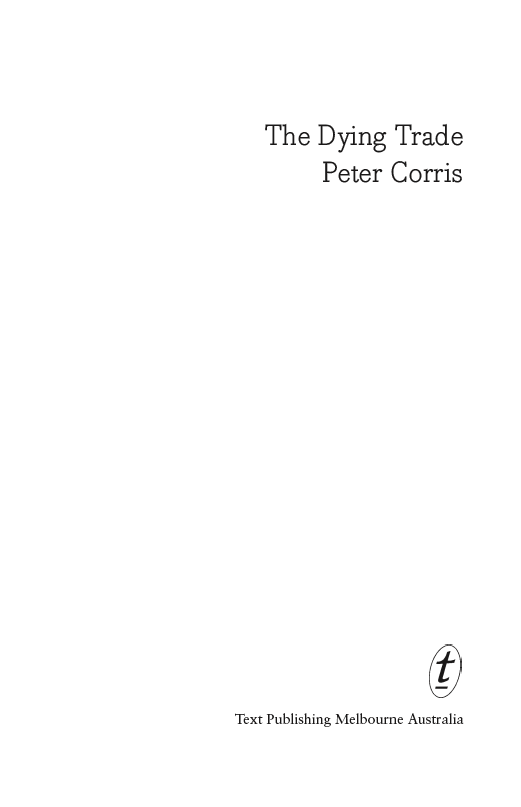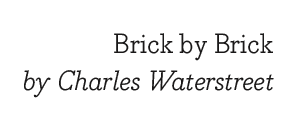The Dying Trade



PETER CORRIS
was born in Victoria in 1942, and did his undergraduate degree at the University of Melbourne. He took a doctorate in history from the ANU, but in the mid-1970s he left academia for journalism. From 1980 to 1981 he was literary editor of the
National Times.
Corris's first Cliff Hardy novel,
The Dying Trade,
was published in 1980. It not only introduced a sleuth who was to become an enduring legend, but was also a long love letter to the seamy side of Sydney
itself. Over more than three decades Corris has now written thirty-
eight Cliff Hardy books, and the city of Sydney is as significant a presence in the books as the figure of Hardy. The third in the series,
The Empty Beach,
was in 1985 made into a film starring Bryan Brown. In 1999 Corris was presented with a Ned Kelly Lifetime Achievement Award.
Peter Corris is the author of more than sixty titles in all. He has written both historical fiction and other crime series. He has also
worked extensively in non-fiction, including an as-told-to autobiography of the Australian eye surgeon Fred Hollows, and books on sport and history. He lives in New South Wales with his family.
CHARLES WATERSTREET
is author of the memoirs
Precious Bodily Fluids
and
Repeating the Leaving
. He was co-creator of
Rake
, the award-winning ABC series. He is currently writing the third volume of his memoirs.
ALSO BY PETER CORRIS
Recent titles from the Cliff Hardy Series
Comeback
Follow the Money
Torn Apart
Deep Water
Selected non-fiction
Heart Matters: Personal stories about that heart-stopping moment
(ed. with Michael Wilding)
Fred Hollows: an autobiography (with Fred Hollows)
Fighting for Fraser Island: the autobiography of John Sinclair
(with John Sinclair)
Ray Barrett (with Ray Barrett)
Best on Ground: Great writers on the great game (ed. with
John Dale)
Lords of the Ring: A social history of prize fighting in Australia

Proudly supported by Copyright Agency's Cultural Fund.

petercorris.net
textclassics.com.au
textpublishing.com.au
The Text Publishing Company
Swann House
22 William Street
Melbourne Victoria 3000
Australia
Copyright © Peter Corris 1980
Introduction copyright © Charles Waterstreet 2012
Every effort has been made to trace copyright holders and obtain permission for the use of copyright material. The publisher apologises for any errors or omissions and would be grateful if notified of any corrections that should be incorporated in future reprints or editions of this book.
All rights reserved. Without limiting the rights under copyright above, no part of this publication shall be reproduced, stored in or introduced into a retrieval system, or transmitted in any form or by any means (electronic, mechanical, photocopying, recording or otherwise), without the prior permission of both the copyright owner and the publisher of this book.
First published by McGraw Hill Australia 1980
This edition published by The Text Publishing Company 2012
Cover design by WH Chong
Page design by WH Chong & Susan Miller
Typeset by Midland Typesetters
Printed in Australia by Griffin Press, an Accredited ISO AS/NZS 14001:2004 Environmental Management System printer
Primary print ISBN: 9781921922176
Ebook ISBN: 9781921981339
This book is printed on paper certified against the Forest Stewardship Council® Standards. Griffin Press holds FSC chain-of-custody certification SGS-COC-005088. FSC promotes environmentally responsible, socially beneficial and economically viable management of the world's forests.
Ebook Production by
Midland Typesetters
Australia

AUSTRALIA
started its white life at a distinct advantage in the telling of criminal stories. Everyone was a criminal. But until Peter Corris invented Cliff Hardy and introduced him in
The Dying Trade
in 1980, we had, as with many of our natural resources, left great seams of these stories in the ground for others to find. Corris may have forged the international reputation of Australian crime fiction almost single-handedly, but I could be wrong, as he uses two hands to type. The waters of the Mississippi and the Potomac might flow through his novels, but his work tastes definitely and defiantly of the Murray Darling, or rather the big beautiful bowl of salty blue water contained in Sydney Harbour. Hardy patrols the city shoreline as if it were his own private verandah. He knows that crime infects all levels of society, under every rock is a paedophile spider, money is always in the wrong hands, the rich abuse their privileges and the poor, physically, sexually and socially. Hardy must work in a conspiracy of one to carve the rot from the good fruit. He does not solve cases so much as create a chaos within the frenzy of plot until secrets fall out of the characters' pockets when he turns their worlds upside down.
The
Atlantic
recently published a song of praise to the brilliant strangeness of Australian crime fiction. Corris was identified as one who gives âno special thought to the foreign reader'. This accounts for the celebration of his work in literary circles. He writes in Australia, about Australia and about Australians, and by being specific he communicates something that can be read internationally. Australian films have flopped, year after year, by following and imitating American trends. The
Atlantic
identified the mateship tradition in the fierce âjoshing camaraderie' that exists in Australia generally but not in America, save occasionally in frat houses. In our country there is a subterranean reflexive prickliness between everyone. Stephen Knight talks of âdryly aggressive wit'. Our verbal blows often fall on deaf ears in foreign countries. We are a nation of smart-arses, ready to joust with anyone.
All this gives Corris another colour to add to the mix. He brings a quick-drying cement to his sentences, where his genius for metaphor lays the words down, brick by brick. We read with a constant suppressed smile, admiring every simile, aghast such serious detective work could be so funny and deadly at the same time. His writing is as arresting and as easy on the eyes as a blonde tanning on Bondi Beach. He captures the permanent smirk on Australian faces and puts it into short bursts of language like rapid fire from a machine-gun. Everyone is in on the joke, all coppers are crooked. It's just a matter of degree.
In
The Dying Trade
Corris's hero travels in traffic âwhich was thick and moving as slow as a senile snail'. His women clients are femmes fatale: one of them has her âeyes shut tight as if she wanted to blind herself'. Detail is king in crime fiction. On arriving at a small coastal town, Hardy discovers that âthe streets were as quiet as a Trappist prayer meeting'. Corris is even-handed in dispensing the best lines to his characters. He is a democratic author; his hero is often outwitted, out-wisecracked and out-thought. He has ethical standards and like Adlai Stevenson he is a man of principle but his first principle is flexibility. Corris gives Hardy's client Ailsa, with whom he has more conflicts of interest than a bookie taking his own bets, this exchange:
I rolled two cigarettes, gave one to Ailsa and lit them. After a few puffs she butted it out.
âI'm going to stop smoking, really! Stop tempting me!'
âYou never know how strong you are till you know how weak you are.'
âBullshit!'
âYes, yes it is.'
I sat down on the bed and ran my fingertips down her arm.
âI'm getting better,' she said, âI won't break.'
I leaned down and kissed her. After a minute she pushed me back. She smoothed down her cap of hair and gave me a look that reminded me that she was paying my hire.
âWell, you certainly broke her up,' she said.
âI didn't mean to, but it was bound to happen.'
âI suppose so, I've never had any children, you?'
âNo.'
âThey make you vulnerable.'
âYou're vulnerable anyway.'
âOh, profound.'
âThat's me.'
I meant it though and I was considering how to face her with her own little piece of vulnerability right then. I couldn't think of any subtle way and it probably wasn't necessary.
âDo you want to know who Susan's son is?'
âYes of course, you've been detecting?'
His characters couldn't be played by foreign stars. Bryan Brown, who portrayed him in
The Empty Beach
, even smells like Cliff Hardy. When we read Corris, we see ourselves, we laugh at ourselves, we cringe at ourselves, and finally we understand ourselves a little better. He reflects the way in which the Australian psyche is imprisoned by its past, the way we walk as if in invisible shackles, our arms handcuffed by our sides instead of raised in outrage. He holds the mirror up to Australian society at a very funny angle that seems about right, a slight angle to the universe. Try this:
Ailsa was sitting up in bed wearing a white cheese-cloth nightgown. She had no make-up on and had lost a lot of colour in her face, her eyes were shadowed and huge so that she looked pale and fragile like a French mime. The bronze hair was newly washed and a bit curly and she had a scrubbed clean look as if she was about to be delivered somewhere. Her face and lips were still puffy and bruised, but when she looked up from her book she managed to work her features into a smile.
âHardy,' she said, âthe great protector.'
Corris has won a Ned Kelly Lifetime Achievement Award for Crime Writing. He has been called the âgodfather of Australian crime writing'. He has written thirty-nine crime novels and has made more out of crime than any barrister I know. What is remarkable is the consistency of excellence in tone and in his impeccable ear for the peculiarities of dialogue between strangers, friends, lovers and enemies. Without Corris, there would be no
Underbelly
series, or dare I say
Rake
, no Australian accent in our crime fighters, criminals, victims, coppers; no Australian point of view in the very stuff of our own restless history.
Cliff Hardy represents the true Australian male at his best: a larrikin, despising greed and conservatism, living hand-to-mouth while cursing the affluence around him. He treats every client as if he or she were a potential hostile witness who will be giving evidence against him one dark day in the future. He has the perfect CV for a PI: ex-army (Malaya), law school drop-out, a real Bra Boy in Maroubra before they had to gang up to make an impression, an ex-insurance investigator who asked too many questions; and finally, like his creator, he comes equipped with an inbuilt bullshit detector.
Corris has outstanding academic qualifications in history and journalism that he does not allow to infect his writing at all. He writes with no hint of self-importance or showing off. He hides his many bright lights under many bushels. He draws chalk lines around victims while they are still walking and talking. In
The Dying Trade
we experience foreboding, dread, prickly anticipation and a real sense of satisfaction that we are in the hands of a master storyteller, a true magician who could pull a rabbit out of a hat at any timeâand shoot it dead.